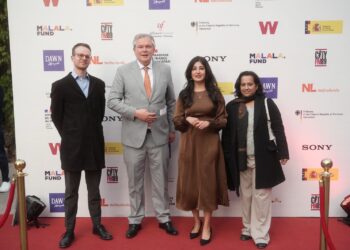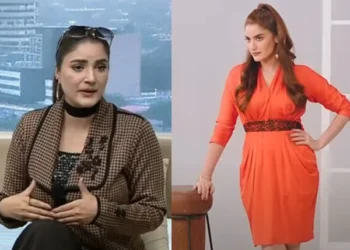Model and actress Saheefa Jabbar Khattak has voiced her frustration with the current state of the Pakistani drama industry, calling out the repetitive storylines, outdated social themes, and unrealistic portrayals of women. In a heartfelt statement posted on her official social media platforms, Saheefa shared her concerns about how the industry continues to rely on toxic tropes that do not reflect the real lives of Pakistani citizens—especially women.
Her bold remarks have ignited a conversation among actors, critics, writers, and fans about the need to revamp the country’s entertainment landscape. Saheefa is known for her outspokenness and has often used her platform to challenge regressive norms in society, making her critique both timely and relevant.
Pakistani Dramas Under Fire: Repetitive Themes and Harmful Tropes
Saheefa’s criticism comes amid growing dissatisfaction among viewers who feel that Pakistani television dramas have become formulaic, melodramatic, and regressive. She pointed out that many dramas revolve around the same themes:
- Forced marriages
- Domestic violence
- Oppressive mother-in-laws
- Misogynistic male leads
- Glamorized portrayals of women in excessive makeup and jewelry
“Every story is the same. Either someone is being forced into marriage, or love is being depicted as some kind of punishment. And the same negative portrayal of mother-in-laws and women in heavy bridal makeup—how long will this continue?” she questioned in her post.
“This Is Not Real Life”: Saheefa Calls for Authentic Storytelling
One of the most pointed criticisms Saheefa made was the disconnect between what is portrayed in dramas and what actually happens in real life. She emphasized that the entertainment industry holds great power in shaping societal views and must act responsibly.
“This isn’t real life. Not every woman wakes up with perfect makeup and heavy jewelry. Not every mother-in-law is cruel. Not every love story has to be tragic or manipulative. These stereotypes are creating a distorted image of our society,” she explained.
She also raised an important question that has sparked debate:
Are we doing this for ratings or are we contributing to the deterioration of society?
The Role of TRPs and the Ratings Race
One of the biggest drivers of repetitive content in the drama industry is the Television Rating Point (TRP) system, which determines which shows are popular based on viewer numbers. Producers and channels often prioritize high ratings over meaningful storytelling, leading to a flood of dramas that recycle the same formulas because they have proven commercially successful.
Saheefa’s statement is a direct challenge to this status quo, asking whether profit-driven storytelling is worth the social cost of spreading outdated or harmful messages. Critics have long pointed out that the desire to attract mass audiences has led to a race to the bottom in terms of creativity and originality.
A Reflection of Society or a Tool of Regression?
There is an ongoing debate about whether television should reflect reality or aspire to shape it positively. While some argue that dramas mirror the issues society already faces—such as gender inequality, toxic relationships, and domestic abuse—others, including Saheefa, believe that showing these issues without offering solutions or nuanced perspectives does more harm than good.
“Our dramas should reflect society positively. They should uplift, educate, and inspire. Instead, we’re reinforcing toxic mindsets and regressive ideas, especially among young viewers who internalize these portrayals,” she stated.
The Need for Realistic and Diverse Narratives
Saheefa called upon creative teams, writers, and producers to take responsibility and start telling new, realistic stories that better represent the diverse experiences of Pakistanis.
Potential Themes That Remain Unexplored:
- Career-oriented women breaking stereotypes
- Healthy romantic relationships based on mutual respect
- Mental health awareness and emotional intelligence
- Social entrepreneurship and youth innovation
- Family dynamics beyond the usual mother-in-law vs. daughter-in-law trope
- Struggles of middle-class families coping with economic pressures
- Stories from rural Pakistan beyond victimhood
Introducing more nuanced and varied characters—such as progressive parents, independent women, supportive male partners, and diverse ethnic identities—could not only diversify content but also improve the overall quality of Pakistani television.
Public Reaction: Mixed Opinions but Growing Support
Saheefa’s remarks have sparked a wave of discussions on social media platforms such as Twitter, Instagram, and Facebook. While many appreciated her candidness and agreed with her call for change, others defended the current state of the industry, arguing that dramas simply reflect societal realities.
Supporters’ Views:
- “Finally, someone from the industry has said it! Pakistani dramas are stuck in a loop of misery.”
- “We need fresh perspectives. Thank you, Saheefa, for standing up for better content.”
Critics’ Views:
- “Dramas show what people want to watch. If the audience didn’t like these themes, they wouldn’t be hits.”
- “Not all dramas are like that—there are some good ones out there.”
Despite differing opinions, one thing is clear: Saheefa has struck a nerve and prompted a much-needed dialogue about the future direction of Pakistani entertainment.
The Influence of Media on Society and Youth
Multiple studies have shown that media has a profound impact on how people—especially young viewers—understand relationships, gender roles, and social values. When the same harmful patterns are repeated across multiple dramas, viewers may begin to accept these portrayals as normal or acceptable.
In a country where literacy and education are not uniformly accessible, TV dramas often serve as informal education tools, especially for women in remote or conservative areas. This makes content responsibility even more crucial.
The Way Forward: Reforming the Pakistani Drama Industry
Saheefa’s criticism should not be seen as an attack on the industry but as a constructive call for introspection and reform. The Pakistani drama industry, once known for bold, socially relevant dramas such as Udaari, Dhoop Kinare, Tanhaiyan, and Alpha Bravo Charlie, has the potential to regain its lost charm and credibility by embracing modern, inclusive narratives.
Key Suggestions for Improvement:
- Diverse Storytelling Teams: Include writers and directors from varied backgrounds and age groups to bring fresh ideas.
- Invest in Script Development: Focus on original screenplays rather than remakes or formulaic plots.
- Training and Workshops: Encourage continuous learning for creative professionals in screenwriting, directing, and acting.
- Audience Education: Promote thoughtful content and discourage viewership of regressive narratives.
- Regulatory Oversight: PEMRA and other media bodies can incentivize quality content and penalize excessive glorification of toxic themes.
Conclusion: A Brave Voice Amid Silence
Saheefa Jabbar Khattak’s criticism serves as a wake-up call for Pakistan’s entertainment industry. Her bold stand reflects a growing demand among viewers for meaningful, realistic, and socially responsible storytelling.
As the industry continues to evolve, voices like Saheefa’s are essential in steering it in a more progressive, inclusive, and constructive direction. With digital platforms, OTT services, and streaming gaining popularity, the competition is no longer limited to local television; global audiences now expect depth, creativity, and truth in storytelling.
The big question remains: Will the industry listen? Or will it continue down the path of high-TRP clichés and tired tropes?
The future of Pakistani television may well depend on the answer.

























